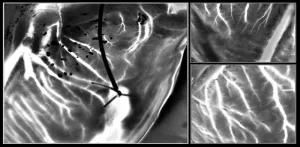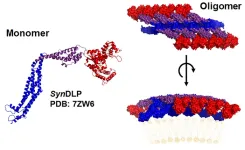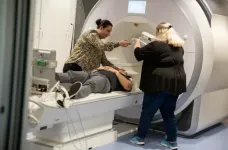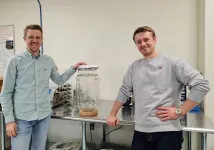(Press-News.org) For 30% to 40% of lymphoma patients who receive CAR T therapy, the treatment is a godsend. Typically given to lymphoma patients for whom other treatments have proven ineffective, CAR T therapy involves removing immune cells from the body via a blood draw, reengineering them to become better cancer fighters, then reintroducing them to the bloodstream, where they seek out and destroy cancer cells.
For 60% to 70% of lymphoma patients who receive CAR T therapy, however, the treatment doesn’t work, and the cancer comes back — typically within a year after treatment. Cancer researchers have started looking into additional treatments for lymphoma patients who relapse after CAR T therapy — one thought being that drugs called checkpoint inhibitors, which prevent proteins in the body from inhibiting the immune system, could be a method for reinvigorating the reengineered immune cells.
University of Colorado Cancer Center member Ajay Major, MD, MBA, assistant professor in the division of hematology in the CU School of Medicine, recently published research in the journal Blood Advances that shows checkpoint inhibitors are not an effective treatment when CAR T fails; he is also interested in the potential of new medications called bispecific antibodies to treat aggressive lymphomas.
We talked with Major about his research.
How did this research get started?
This was a project I started working on during my fellowship at the University of Chicago. We were struggling with this exact problem: When people relapse after CAR T, how do we help them? My mentor at the University of Chicago, Justin Kline, MD, has done a lot of research on the tumor microenvironment, or how the immune system affects the CAR T cells, as well the tumor cells themselves. There was some initial research that showed we could potentially rejuvenate CAR T cells by giving these checkpoint inhibitor therapies that act on PD-1 and PD-L1 proteins.
How exactly do the checkpoint inhibitors work to rejuvenate the CAR T cells?
PD-1 and PD-L1 are proteins in the body that are considered inhibitory, which means that they basically “turn down” the immune system. This is seen in a lot of cancer types. What some research found is that in patients who had relapsed, aggressive lymphomas after CAR T therapy, when you looked at their tumors again, not only the CAR T cells, but also the cells in the tumor had high levels of PD-1 and PD-L1. We already have checkpoint inhibitor drugs that block those inhibitory proteins, so the idea is, could we prevent that inhibition that's happening in the immune system and potentially allow the CAR T cells to expand and become active again?
What questions were you looking to answer with your research?
One of the reasons we think that CAR T stops working is that the CAR T cells become exhausted. So researchers have been looking at ways to rejuvenate those cells, or “refuel the CAR.” There was some initial research that showed that checkpoint inhibitors might be a way to do that, but no one had studied a large group of patients. There were smaller studies that had been done. Dr. Kline and I said, “We should probably get together as many patients as we can, in a multicenter study, and see what is really happening."
How much data did you look at for this study?
We were able to collect data on 96 patients from 15 centers, thanks in large part to CU Cancer Center members Brad Haverkos, MD, and Manali Kamdar, MD, who provided many patient cases to this study. This isn't a super-common scenario, so we wanted to gather as many patients as possible. We also wanted to see how this strategy works in the real world, rather than a clinical trial setting where you get to select patients.
What were your findings?
What we found is that this strategy of using checkpoint inhibitors after CAR T fails doesn't appear to be very effective for most patients. Only 19% of patients had a response to checkpoint inhibitor therapy, and only 10% had a complete response. The amount of time that people were alive without progression of the disease — also known as progression-free survival — is only 54 days, and the average survival was only 159 days.
Was that in line with what you were expecting?
While we were putting together the study, I talked to many colleagues who treat lymphoma. Most of them agreed that these numbers lined up with their anecdotal experiences treating these patients. Only 5% of patients in this study had long-term remissions just from the checkpoint inhibitor. Overall, the strategy doesn't seem to be working in most patients.
Was the goal of your research to eliminate checkpoint inhibitors as a strategy in this situation?
What we were attempting to do was to see if this really works in the real world. And if it does, are there specific groups of patients for whom this strategy might work? One of the things we found is that patients with certain types of lymphoma, specifically primary mediastinal B cell lymphoma, and also patients who had a later relapse after CAR T — people who had relapsed six months or later after they receive CAR T — had better responses to this strategy.
What do you want people to take away from your research?
There has been a lot of research put into this space, and we wanted to find out if this is really the right strategy to pursue for patients. We know that some of the bispecific antibody therapies and other targeted agents that are coming out work well on aggressive lymphomas after CAR T has stopped working. That's what we have to think about — if CAR T doesn't work for everyone, we need to come up with better strategies for which treatments have the best effectiveness. At this point, the checkpoint inhibitors, except for a very select amount of patients, don't seem to be that effective. I think we should be putting our resources into some of these other agents that we know are more effective, and our vision in the lymphoma program is to open new clinical trials and develop new therapeutic approaches targeting this clearly unmet need for our patients.
END
What is the best lymphoma treatment after CAR T therapy fails?
CU Cancer Center member Ajay Major published research showing that checkpoint inhibitor therapies are not particularly effective at treating relapsed aggressive lymphomas in patients who received CAR T treatment.
2023-04-25
ELSE PRESS RELEASES FROM THIS DATE:
ASTRO and ESTRO issue clinical guideline on local therapy for oligometastatic lung cancer
2023-04-25
ARLINGTON, Va., April 25, 2023 — A new clinical guideline from the American Society for Radiation Oncology (ASTRO) and European Society for Radiotherapy & Oncology (ESTRO) provides guidance on the use of definitive local therapy—including radiation and surgery—to treat patients with oligometastatic non-small cell lung cancer (NSCLC). The guideline is published in Practical Radiation Oncology.
The guideline emphasizes the need for a multidisciplinary team approach to guide treatment decisions for oligometastatic disease, a description for cancer that reaches a state in which the patient has a small number of metastases in addition to a primary tumor. ...
Woodpecker guides post-fire forest management
2023-04-25
Ithaca, NY—What's good for the Black-backed Woodpecker is good for restoration of burned California forests. The birds' unique relationship with fire underpins the latest research into improved post-fire management. A study published in Ecological Applications describes a new tool that factors how fires burn into forest management decisions and turns science into action for wildlife conservation.
"Wildfire is like a 10,000-piece puzzle, and climate change is rearranging the pieces," said lead author Andrew Stillman with the Cornell Atkinson Center for Sustainability and the Cornell Lab of Ornithology. "Gigantic, severe fires ...
Emerging treatment for children with long COVID and recurrent fever
2023-04-25
Researchers at National Jewish Health found that a subset of children suffering recurring fevers as a result of long COVID-19, benefited from a daily medication treatment commonly used for gout and periodic fever syndrome. Using the drug Colchicine, researchers saw rapid improvement not only in their fevers but also with other long COVID symptoms such as brain fog, fatigue, and achiness. The case study was just published in Journal of Allergy and Clinical Immunology, (JACI: In Practice).
Long COVID is defined as persistent symptoms lasting ...
nTIDE April 2023 Deeper Dive: Hispanics with disabilities making historic rebound in job market post-COVID-19 shutdown
2023-04-25
East Hanover, NJ – April 25, 2023 – New data shows that Hispanics with disabilities in the United States rebounded to historic levels in the labor force following the first 12-month period of the COVID-19 pandemic. While the disparity between their non-Hispanic white counterparts remains, their recovery has narrowed this gap and surpassed that of their black/African American counterparts, according to experts speaking during last Friday’s nTIDE Deeper Dive Lunch & Learn Webinar. To further improve employment opportunities ...
Laser speckle imaging can identify hearts suitable for transplantation
2023-04-25
In the majority of cases, graft failure after heart transplantation is attributable to abnormalities like severe coronary artery disease. As donors with extended criteria like advanced age and pre-existing heart conditions become eligible for heart transplantation, careful screening for congenital abnormalities has become crucial. Invasive coronary angiography is an essential screening tool that can detect coronary artery disease (CAD), a condition characterized by cholesterol deposits in the heart's arteries. However, logistical challenges limit utility so it’s used for fewer than a third of donors who are at risk of developing CAD.
To overcome this limitation, a new heart ...
Relatives discovered: Membrane proteins of cyanobacteria and higher organisms are structurally highly similar
2023-04-25
-- JOINT PRESS RELEASE OF FORSCHUNGSZENTRUM JÜLICH AND JOHANNES GUTENBERG UNIVERSITY MAINZ --
SynDLP could be a bacterial ancestor of eukaryotic membrane proteins
The cells of living organisms are equipped with proteins that are involved in the shaping and remodeling of cellular membranes, thereby performing important tasks. The cell membrane encloses the cell interior, but is constantly remodeled, for example, due to membrane budding, invagination, or fusion processes. This also involves various proteins that were long assumed to be present exclusively or predominantly in higher organisms. ...
Medium-sized black holes eat stars like messy toddlers
2023-04-25
If they exist, intermediate-mass black holes likely devour wayward stars like a messy toddler — taking a few bites and then flinging the remains across the galaxy — a new Northwestern University-led study has found.
In new 3D computer simulations, astrophysicists modeled black holes of varying masses and then hurled stars (about the size of our sun) past them to see what might happen.
When a star approaches an intermediate-mass black hole, it initially gets caught in the black hole’s orbit, the researchers discovered. After that, the black hole begins its lengthy and violent meal. Every time the star makes a lap, the black hole takes a bite — ...
Fishermen-developed “banger bar” helps reduce risk of injury on crab boats, OSU study finds
2023-04-25
Dungeness crab fishermen are at high risk for on-the-job injury, but having a metal bar to bang crab pots against as they harvest can help them prevent injury, an Oregon State University study found.
The study sought to determine whether the fishermen-designed “banger bar” actually improves worker safety aboard crab vessels. The metal bar is installed atop the crab-sorting table and makes it easier for fishermen to empty the crab pots they haul up from the ocean floor, but there is no industry standard on whether crabbers install one or how they ...
New Parkinson's research could allow doctors to map brain of patients with neurodegenerative disorder
2023-04-25
1. Introduction
While the pathophysiology of Parkinson’s disease (PD) is not fully understood, it has been traditionally linked to a reduction in the dopamine available to brain regions involved in motor control (Alexander, 2004, Brooks, 2010, Fahn, 2008, Meder et al., 2019, Obeso et al., 2017, Poewe et al., 2017). It is important to note that much of what is known about the neural bases of motor deficits in PD is based on task-based functional magnetic resonance imaging (fMRI) studies showing abnormal motor-related blood oxygen ...
Researcher aims to create a sustainable protein source powered by hydrogen
2023-04-25
Lutz Grossmann is on a scientific mission to create tasty, animal-free protein that has a low carbon footprint and is produced without relying on agricultural land – a usual and progressively stressed source of the global food supply.
“The increasing global population and a changing climate increase the pressure on our food and protein supply coming from these natural habitats,” says Grossmann, an assistant professor of food science at the University of Massachusetts Amherst.
“By 2050, we need ...
LAST 30 PRESS RELEASES:
Visible light-driven deracemization of α-aryl ketones synergistically catalyzed by thiophenols and chiral phosphoric acid
Most AI bots lack basic safety disclosures, study finds
How competitive gaming on discord fosters social connections
CU Anschutz School of Medicine receives best ranking in NIH funding in 20 years
Mayo Clinic opens patient information office in Cayman Islands
Phonon lasers unlock ultrabroadband acoustic frequency combs
Babies with an increased likelihood of autism may struggle to settle into deep, restorative sleep, according to a new study from the University of East Anglia.
National Reactor Innovation Center opens Molten Salt Thermophysical Examination Capability at INL
International Progressive MS Alliance awards €6.9 million to three studies researching therapies to address common symptoms of progressive MS
Can your soil’s color predict its health?
Biochar nanomaterials could transform medicine, energy, and climate solutions
Turning waste into power: scientists convert discarded phone batteries and industrial lignin into high-performance sodium battery materials
PhD student maps mysterious upper atmosphere of Uranus for the first time
Idaho National Laboratory to accelerate nuclear energy deployment with NVIDIA AI through the Genesis Mission
Blood test could help guide treatment decisions in germ cell tumors
New ‘scimitar-crested’ Spinosaurus species discovered in the central Sahara
“Cyborg” pancreatic organoids can monitor the maturation of islet cells
Technique to extract concepts from AI models can help steer and monitor model outputs
Study clarifies the cancer genome in domestic cats
Crested Spinosaurus fossil was aquatic, but lived 1,000 kilometers from the Tethys Sea
MULTI-evolve: Rapid evolution of complex multi-mutant proteins
A new method to steer AI output uncovers vulnerabilities and potential improvements
Why some objects in space look like snowmen
Flickering glacial climate may have shaped early human evolution
First AHA/ACC acute pulmonary embolism guideline: prompt diagnosis and treatment are key
Could “cyborg” transplants replace pancreatic tissue damaged by diabetes?
Hearing a molecule’s solo performance
Justice after trauma? Race, red tape keep sexual assault victims from compensation
Columbia researchers awarded ARPA-H funding to speed diagnosis of lymphatic disorders
James R. Downing, MD, to step down as president and CEO of St. Jude Children’s Research Hospital in late 2026
[Press-News.org] What is the best lymphoma treatment after CAR T therapy fails?CU Cancer Center member Ajay Major published research showing that checkpoint inhibitor therapies are not particularly effective at treating relapsed aggressive lymphomas in patients who received CAR T treatment.







